Jackson, Mississippi Blood Testing Facilities
 Represents a LabCorp blood testing facility
Represents a LabCorp blood testing facility Represents a Quest Diagnostics blood testing facility
Represents a Quest Diagnostics blood testing facility

Nearby Labcorp Blood Testing facilities:
- Labcorp Center Distance: 7 m, 4816 Lakeland Dr, Jackson, Rankin County, MS, 39232
- Labcorp Center Distance: 74 m, 1010 West 1St Street, Laurel, Jones County, MS, 39440
Nearby Quest Blood Testing facilities:
- Quest Center Distance: 5 m, 1050 River Oaks Drive, Flowood, Rankin County, MS, 39232-9533
Jackson Mississippi Hormone Replacement Therapy Services
Hormone Optimization has become a national phenomenon over the last twenty years, and is only growing more popular by the day. Hormone Balance is the key to longevity and peak wellness, and the Conscious Evolution Institute specializes in state-of-the-art Hormone Treatments which are designed to keep your life happy and healthy. Our Board-Certified and Fully-Licensed Hormone Clinic is happy to serve the Jacksonville Mississippi Metropolitan Area, and we have affiliate medical associates located all around the state of Mississippi that help us in our quest to help our patients live longer and healthier lives free from the negative effects of Hormone Imbalance.
If you are over the age of thirty, and feel that you may benefit from the HRT Services that we provide, then we would be honored to serve you as a patient. We can arrange for a Comprehensive Hormone Panel and general diagnostic screening that will help us get a highly precise snapshot of your overall Hormone Levels and health state, so that we can help you design a Hormone Therapy Regimen that will help your body function at a more streamlined capacity.
Just give us a call at the top of the page or complete the form that you see on this page in order to set up a consultation with one of our qualified Hormone Doctors. They can answer any questions and respond to any concerns that you may have regarding Hormone Restoration and Optimization with HGH, Testosterone, and More.
Jackson Mississippi Low-T Clinic for Testosterone Therapy
Testosterone Deficiency is a serious form of Hormone Imbalance that has a serious and noticeable effect on various aspects of one's health, and can also shorten your life by years if it is not treated appropriately with Bio-Identical Testosterone. Most men (and women) are aware that Low-T leads to sexual dysfunction, failure to perform, and low libido, but it also leads to other symptoms such as weight gain, loss of strength, anxiety, and other noticeable side-effects.
Even more disconcerting, Low-T also has many symptoms that patients don't see and don't realize, often until it is too late. For example. Testosterone Deficiency leads to cardiovascular issues and poor cholesterol. It increases the risk of diabetes and heart disease, as well as heart attack and stroke. If you've noticed the sexual symptoms of Testosterone Deficiency making their way into your life, its time to see a doctor about Prescription Testosterone Therapy.
Testosterone HRT has decades of science and research which have backed its efficacy, and you can safeguard yourself from the negative effects of Low-T with affordable Testosterone Treatments such as Low-T Injections, Testosterone Patches, and Testosterone Transdermal Gels or Creams. In just a matter of weeks and months, you can see tremendous change in your own health and your own life.
Jackson Mississippi Human Growth Hormone Deficiency Treatments for Hypopituitarism
In addition to Testosterone Restoration, our Jackson Hormone Clinic also offers Prescription HGH for the treatment of clinically diagnosed Human Growth Hormonre Deficiency for men and women over thirty years old. HGH Deficiency is a major medical malady which afflicts a large number of patients all across Mississippi and the United States. Growth Hormone is a modulator of cellular metabolism, and in having such an important role, abnormally low HGH Levels can impact the proper function of practically all systems within the human body.
Patients suffering from Human Growth Hormone Deficiency are more likely to suffer from obesity, lack of energy, osteoporosis, mild cognitive impairment, depression, and more. The goal of HGH Therapy is to boost Growth Hormone Levels to levels associated with youthful health and vitality in order to relieve the symptoms of HGH Deficiency.
If you are interested in HGH Prescription from a Jacksonville Mississippi Hormone Clinic, we are happy to provide you with offordable HRT Products that can be delivered directly to your home. Don't let HGH Deficiency debilitate you and your ability to enjoy your life. Contact us today!
Sermorelin Prescriptions in Jackson Mississippi
HGH Shots are not the only means by which to treat Growth Hormone Deficiency, however. Sermorelin Acetate has a proven track record at treating Age-Associated Hypopituitarism, and is comparably effective as Growth Hormone Injections, while being more affordable and available off-label at the discretion of your prescribing physician. Sermorelin works because it is able to simulate the physiological effects of natural GH-RH on the human body.
In fact, Sermorelin has the exact same effect on the human body as GH-RH—it stimulates the pituitary to create natural Human Growth Hormone. It's even recombinantly derived from the hormone. If you'd like to learn more about how HGH Injections and Sermorelin Acetate compare in the treatment of Adult-Onset HGH Deficiency, our Hormone Specialists would be happy to explain the benefits of both Hormone Treatments to you in more detail!
Jackson Mississippi Information
Jackson is the most populous city in the state of Mississippi. The city is situated in three counties: Rankin, Madison, and primarily in Hinds County. Like so many cities in the South, it is named after the seventh president of the United States of America: Andrew Jackson. Suburbs of Jackson include Ridgeland, Madison, Pearl, and Brandon Mississippi. Among the neighborhoods in Jackson are Briarwood Heights, Sheffield, Heatherwood, Northeast, Northpointe Estate, East Brooke, Heatherton, Greater Belhaven, Lake Trace, and Bellevue Oaks.
The city of Jackson is notable for being one of the most affordable major cities in the United States, as well as one of the friendliest. Museums in Jackson include The Oaks House Museum, the Mississippi Museum of Natural Science, the Mississippi Governor's Mansion, the Manship House Museum, and the Eudora Welty House Museum. Other places to see in Jackson are Smith Park, the Mississippi Arts Center, the Jackson Zoo, and the Alamo Theater. Mississippi College, Jackson State University, and Belhaven University are all located in Jackson. The city is referred to as the City with Soul for its large influence on the growth and development of the Blues in the 20th century South.
All About Jackson, Mississippi Geographic Area

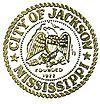
Jackson is the capital and the most populous city of the US state of Mississippi. It is one of two county seats of Hinds County (the town of Raymond is the other), south of the Yazoo River, considered the southern border of the Mississippi Delta.
The population of the city declined from 184,256 at the 2000 census to 173,514 at the 2010 census. The 2010 census ascribed a population of 539,057 to the five-county Jackson metropolitan area.
The current slogan for the city is "Jackson, Mississippi: City with Soul." Jackson is ranked 3rd out of America's 100 largest metro areas for the best "Bang For Your Buck" city according to Forbes magazine. The study measured overall affordability, housing rates, and more. The city is named after Andrew Jackson, who was a general at the time of the naming but later became president of the United States. The city is the anchor of the Metro area.
USS Jackson (LCS-6) will be the first ship of the United States Navy to be named in honor of the city.
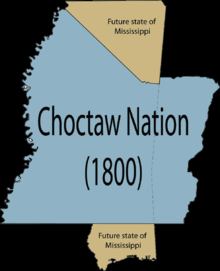
The region which is now the city of Jackson was historically part of the large territory occupied by the Choctaw Nation, the last of the indigenous peoples who had inhabited the area for thousands of years. The area now called Jackson was obtained by the United States under the terms of the Treaty of Doak's Stand in 1820, by which the Choctaw ceded some of their land. After the treaty was ratified, European-American settlers began to move into the area, so many that they encroached on remaining Choctaw land.
Under pressure from the US government, the Choctaw Native Americans agreed to removal after 1830 from all their lands east of the Mississippi River under the terms of several treaties. Although most of the Choctaw moved to Indian Territory in present-day Oklahoma, along with the other of the Five Civilized Tribes, a significant number chose to stay in their homeland, citing Article XIV of the Treaty of Dancing Rabbit Creek. They gave up their tribal membership and became state and United States citizens at the time. Today, most Choctaw in Mississippi who are part of the federally recognized Mississippi Band of Choctaw Indians live in several Indian communities located throughout the state. The largest community is located in Choctaw 100 mi (160 km) northeast of Jackson.
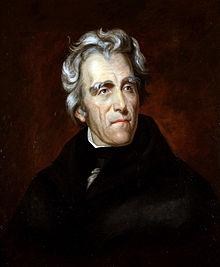
The area that is now Jackson was initially referred to as Parkerville and was settled by Louis LeFleur, a French Canadian trader, along the historic Natchez Trace trade route. The area then became known as LeFleur's Bluff. LeFleur's Bluff was founded based on the need for a centrally located capital for the state of Mississippi. In 1821, the Mississippi General Assembly, meeting in the then-capital of Natchez, had sent Thomas Hinds (for whom Hinds County is named), James Patton, and William Lattimore to look for a site. The absolute center of the state was a swamp, which forced the group to look close by for a new capital. After surveying areas north and east of Jackson, they proceeded southwest along the Pearl River until they reached LeFleur's Bluff in Hinds County. Their report to the General Assembly stated that this location had beautiful and healthful surroundings, good water, abundant timber, navigable waters, and proximity to the trading route Natchez Trace. And so, a legislative Act passed by the Assembly on November 28, 1821, authorized the location to become the permanent seat of the government of the state of Mississippi. One Whig politician lamented the new capital as a "serious violation of principle" because it was not at the absolute center of the state (a swamp occupied this spot).
Jackson was named for General Andrew Jackson, later the seventh President of the United States, in recognition of his victory in the Battle of New Orleans.
During the late 18th century and early 19th century, the area was traversed by the Natchez Trace, on which a trading post stood before a treaty with the Choctaw, the Treaty of Doak's Stand in 1820, formally opened the area for non-native American settlers.
Jackson was originally planned, in April 1822, by Peter Van Dorn in a "checkerboard" pattern advocated by Thomas Jefferson, in which city blocks alternated with parks and other open spaces, giving the appearance of a checkerboard. This plan has not lasted to the present day.
The state legislature first met in Jackson on December 23, 1822.
In 1839, Jackson was the site of the passage of the first state law that permitted married women to own and administer their own property.
Jackson was first linked with other cities by rail in 1840. An 1844 map shows Jackson linked by an east-west rail line running between Vicksburg, Raymond, and Brandon. Unlike Vicksburg, Greenville, and Natchez, Jackson is not located on the Mississippi River, and did not develop like those cities from river commerce. Instead, railroads would later spark growth of the city in the decades after the American Civil War.

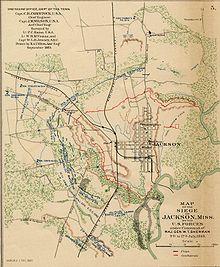
Despite its small population, during the Civil War, Jackson became a strategic center of manufacturing for the Confederate States of America. In 1863, during the campaign which ended in the capture of Vicksburg, Union forces captured Jackson during two battles aeonce before the fall of Vicksburg and once after the fall of Vicksburg.
On May 13, 1863, Union forces won the first Battle of Jackson, forcing Confederate forces to flee northward towards Canton. On May 15, Union troops under the command of William Tecumseh Sherman burned and looted key facilities in Jackson, a strategic manufacturing and railroad center for the Confederacy. After driving the Confederate forces out of Jackson, Union forces turned west once again and engaged the Vicksburg defenders at the Battle of Champion Hill in nearby Edwards. The siege of Vicksburg began soon after the Union victory at Champion Hill. Confederate forces began to reassemble in Jackson in preparation for an attempt to break through the Union lines surrounding Vicksburg and end the siege there. The Confederate forces in Jackson built defensive fortifications encircling the city while preparing to march west to Vicksburg.
Confederate forces marched out of Jackson to break the siege of Vicksburg in early July 1863. However, unknown to them, Vicksburg had already surrendered on July 4, 1863. General Ulysses S. Grant dispatched General Sherman to meet the Confederate forces heading west from Jackson. Upon learning that Vicksburg had already surrendered, the Confederates retreated back into Jackson, thus beginning the Siege of Jackson, which lasted for approximately one week. Union forces encircled the city and began an artillery bombardment. One of the Union artillery emplacements still remains intact on the grounds of the University of Mississippi Medical Center in Jackson. Another Federal position is still intact on the campus of Millsaps College. One of the Confederate Generals defending Jackson was former United States Vice President John C. Breckenridge. On July 16, 1863, Confederate forces slipped out of Jackson during the night and retreated across the Pearl River. Union forces completely burned the city after its capture this second time, and the city earned the nickname "Chimneyville" because only the chimneys of houses were left standing. The northern line of Confederate defenses in Jackson during the siege was located along a road near downtown Jackson, now known as Fortification Street.
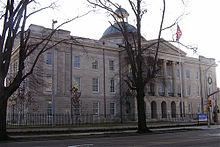
Today there are few antebellum structures left standing in Jackson. One surviving structure is the Governor's Mansion, built in 1842, which served as Sherman's headquarters. Another is the Old Capitol building, which served as the home of the Mississippi state legislature from 1839 to 1903. There the Mississippi legislature passed the ordinance of secession from the Union on January 9, 1861, becoming the second state to secede from the United States.
In 1875 the Red Shirts were formed, one of a second wave of insurgent paramilitary organizations that essentially operated as "the military arm of the Democratic Party" to take back political power from the Republicans and to drive blacks from the polls. Democrats regained control of the state legislature in 1876. The constitutional convention of 1890, which produced Mississippi's Constitution of 1890, was also held at the capitol. This was the first of new constitutions or amendments ratified in southern states through 1908 that effectively disfranchised African Americans and poor whites, through provisions making voter registration more difficult: such as poll taxes, residency requirements, and literacy tests. These provisions survived a Supreme Court challenge in 1898. As 20th century Supreme Court decisions began to find such provisions unconstitutional, Mississippi and other southern states rapidly devised new methods to continue disfranchisement of most blacks.
The economic recovery was slow through the turn of the century, but there were some developments in transportation. In 1871, the city introduced mule-drawn streetcars which ran on State Street, which were replaced by electric ones in 1899.
The so-called New Capitol replaced the older structure upon its completion in 1903, and today the Old Capitol is a historical museum. A third important surviving antebellum structure is the Jackson City Hall, built in 1846 for less than $8,000. It is said that Sherman, a Mason, spared it because it housed a Masonic Lodge, though a more likely reason is that it housed an army hospital.

Pulitzer Prize-winning author Eudora Welty was born in Jackson in 1909, lived most of her life in the Belhaven section of the city, and died there in 2001. Her memoir of development as a writer, One Writer's Beginnings (1984), presented a charming picture of the city in the early twentieth century. The main Jackson Public Library was named in her honor.
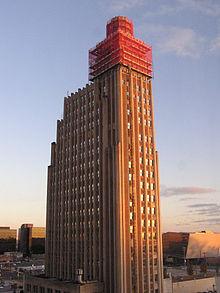
The highly acclaimed African-American author Richard Wright lived in Jackson as an adolescent and young man in the 1910s and 1920s. He related his experience in his memoir Black Boy (1945). He described the harsh and largely terror-filled life most African Americans experienced in the South and northern ghettos under segregation in the early twentieth century.
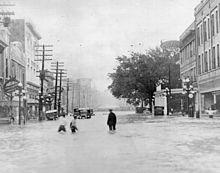
Jackson saw significant growth in the early twentieth century, as reflected in changes in the city's skyline. Jackson's new Union Station downtown reflected the city's service by multiple rail lines, including the Illinois Central. Across the street, the new, luxurious King Edward Hotel, long the center of Jackson society and Mississippi politics, opened its doors in 1923, having been built according to a design by New Orleans architect William T. Nolan. Nearby, the 18-story Standard Life Building, designed in 1929 by Claude Lindsley, became the largest reinforced concrete structure in the world upon its completion. Jackson's economic growth was further stimulated in the 1930s by the discovery of natural gas fields nearby.
Speculators began searching for oil and natural gas in Jackson beginning in 1920. The initial drilling attempts of the early twenties came up empty. This initial failure did not stop Ella Render from obtaining a lease from the state aos insane asylum to begin a well in 1924. Render found natural gas, but eventually lost the rights when courts determined that the asylum did not have the right to lease the state aos property. Businessmen jumped on the opportunity and dug wells in the Jackson area. The continued success of these ventures attracted further investment and by 1930, there were fourteen derricks in the Jackson skyline. Governor Theodore Bilbo stated auit is no idle dream to prophecy that the state aos share [of the oil and natural gas profits] properly safe-guarded would soon pay the state aos entire bonded indebtedness and even be great enough to defray all the state aos expenses and make our state tax free so long as obligations are concerned. au This enthusiasm was subdued when the first well aos failed to produce oil of a sufficiently high gravity for commercial success. The barrels of oil had considerable amounts of salt water which lessened the quality. However, all was not lost. The governor aos prediction is wrong in hindsight, but the oil and natural gas industry was a tremendous business for the city and state. The effects of the Great Depression were mollified by the industry aos success. At its height in 1934, there were one hundred and thirteen producing wells in the state. The overwhelming majority were closed by 1955.
During World War II, Hawkins Field in northwest Jackson became a major airbase. Among other facilities and units, the Royal Netherlands Military Flying School was established there, after Nazi Germany occupied the Netherlands. From 1941, the base trained all Dutch military aircrews.
Since 1960, Jackson has undergone a series of dramatic changes and growth. In 1960, the Census Bureau reported Jackson's population as 64.3% white and 35.7% black. As the state capital, it became a site for civil rights activism that was heightened by mass demonstrations during the 1960s. On May 24, 1961, during the African-American Civil Rights Movement, more than 300 Freedom Riders were arrested in Jackson for disturbing the peace after they disembarked from their bus. They were riding the bus to demonstrate against segregation on public transportation. Although the Freedom Riders had intended New Orleans, Louisiana as their final destination, Jackson was the farthest that any of them managed to travel.
Efforts to desegregate Jackson facilities began before the Freedom Rides when nine Tougaloo students were arrested for attempting to read books in the "white only" public library. Founded as a historically black college (HBCU) by the American Missionary Movement after the Civil War, Tougaloo College brought both black and white students together to work for civil rights. It also created partnerships with neighboring mostly white Millsaps College to work with student activists. It has been recognized as a site on the Civil Rights Trail by the National Park Service. After the Freedom Rides, students and activists of the Freedom Movement launched a series of merchant boycotts, sit-ins and protest marches, from 1961 to 1963.
In Jackson, shortly after midnight on June 12, 1963, Medgar Evers, civil rights activist and leader of the Mississippi chapter of the NAACP, was murdered by Byron De La Beckwith, a white supremacist. Thousands marched in his funeral procession to protest the killing. In 1994, prosecutors Ed Peters and Bobby DeLaughter finally obtained a murder conviction of De La Beckwith. A portion of U.S. Highway 49, all of Delta Drive, a library, the central post office for the city, and Jackson-Evers International Airport were named in honor of Medgar Evers. During 1963 and 1964, organizers did voter education and voter registration. In a pilot project, they rapidly registered 80,000 voters across the state, demonstrating the desire of African Americans to vote. In 1964 they created the Mississippi Freedom Democratic Party as an alternative to the all-white state party, and sent an alternate slate of candidates to the national party convention.
Segregation and the disfranchisement of African Americans gradually ended after the Civil Rights Movement gained passage of the Civil Rights Act of 1964 and Voting Rights Acts of 1965. In June 1966, Jackson was also the terminus of the James Meredith March, organized by James Meredith, the first African-American to enroll at the University of Mississippi. The march, which began in Memphis, Tennessee, was an attempt to garner support for implementation of civil rights legislation. It was accompanied by a new drive to register African-Americans to vote in Mississippi. In this latter aim, it succeeded in registering between 2,500 and 3,000 black Mississippians to vote. The march ended on June 26 after Meredith, who had been wounded by a sniper's bullet earlier on the march, addressed a large rally of some 15,000 people in Jackson.
As a result of riots which followed the enrollment of James Meredith at the University of Mississippi, and residents taking down street signs to hinder the arrival of US Army forces whilst US Marshals held back rioters during the night at the University, the city of Jackson was placed under martial law by the Army for a 1 year period by order of Congress and President John F. Kennedy.
In September 1967 the Ku Klux Klan bombed the synagogue building of the Beth Israel Congregation in Jackson, and in November bombed the house of its rabbi, Dr. Perry Nussbaum.
Gradually the old barriers came down. Since then, both whites and African Americans in the state have had a high rate of voter registration and turnout.
On June 26, 2011, a 49 year old James Craig Anderson was killed in Jackson after being beaten and robbed by a group of white teenagers in what has been described by the district attorney as a "crime of hate" and is under investigation by the FBI as a civil rights violation.
The first successful cadaveric lung transplant was performed at the University of Mississippi Medical Center in Jackson in June 1963 by Dr. James Hardy. Hardy transplanted the cadaveric lung into a patient suffering from lung cancer. The patient survived for eighteen days before dying of kidney failure.
Since 1968, Jackson has been the home of Malaco Records, one of the leading record companies for gospel, blues and soul music in the United States. In January 1973, Paul Simon recorded the songs "Learn How To Fall" and "Take Me To the Mardi Gras", found on the album There Goes Rhymin' Simon, in Jackson at the Malaco Recording Studios. Many well-known Southern artists recorded on the album including the Muscle Shoals Rhythm Section (David Hood, Jimmy Johnson, Roger Hawkins, Barry Beckett), Carson Whitsett, the Onward Brass Band from New Orleans and others. The label has recorded many leading soul and blues artists including Bobby Bland, ZZ Hill, Latimore, Shirley Brown, Denise LaSalle and Tyrone Davis.
On May 15, 1970 police killed two students and wounded 12 at Jackson State University (then called Jackson State College) after a protest of the Vietnam War included overturning and burning some cars. These killings occurred ten days after the National Guard killed four students in an anti-war protest at Kent State University in Ohio, and were part of national social unrest. Newsweek cited the Jackson State killings in its issue of May 18 when it suggested that U.S. President Richard Nixon faced a new home front.
In 1997, Harvey Johnson, Jr. became the city's first African-American mayor. During his term, he proposed the creation of a convention center, in hopes of attracting business to the city. In 2004, during his second term, 66 percent of the voters passed a referendum for a tax to build the Convention Center. As a result of this vote, many new development projects are underway in Downtown Jackson.
Mayor Johnson was replaced by Frank Melton on July 4, 2005. Melton subsequently generated controversy through his unconventional behavior, which included acting as a law enforcement officer. A dramatic spike in crime also ensued, despite Melton's efforts to reduce crime. This spike in crime can be directly attributed to the wave of displaced New Orleans residents that moved to Jackson following Hurricane Katrina. The lack of jobs contributed to crime.
2007 saw a historic first for Mississippi as Hinds County sheriff Malcolm McMillin was appointed as the new police chief in Jackson. McMillin was both the county sheriff and city police chief until 2009 when he stepped down due to the disagreements with the current mayor. Mayor Frank Melton died in May 2009 and City Councilman Leslie McLemore served as acting mayor of Jackson until July 2009 when former Mayor Harvey Johnson assumed the Mayor position.
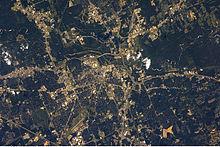
Jackson is located on the Pearl River, and is served by the Ross Barnett Reservoir, which forms a section of the Pearl River and is located northeast of Jackson on the border between Madison and Rankin counties. A tiny portion of the city containing Tougaloo College lies in Madison County, bounded on the west by I-220 and on the east by US 51 and I-55. A second portion of the city is located in Rankin County. In the 2000 census, 683,723 of the city's 684,256 residents (99.7%) lived in Hinds County and 1,533 (0.3%) in Madison County. Although no Jackson residents lived in the Rankin County portion in 2000, that figure had risen to 172 by 2006.
According to the United States Census Bureau, the city has a total area of 106.8 square miles (277 km2), of which, 104.9 square miles (272 km2) is land, and 1.9 square miles (4.9 km2), or 1.80% of the total, is water.
Jackson sits atop the Jackson Volcano and is the only capital city in the United States to have this feature. The peak of the volcano is located 2,900 feet (880 m) directly below the Mississippi Coliseum.
Jackson is located in the humid subtropical climate zone (Koppen Cfa), with hot, humid summers and mild winters. Rain occurs throughout the year, though the winter and spring are the wettest seasons, and the late summer and early autumn is usually the driest time of the year. Snow is rare, and accumulation very seldom lasts more than a day. Much of Jackson's rainfall occurs during thunderstorms. Thunder is heard on roughly 70 days each year. Jackson lies in a region prone to severe thunderstorms which can produce large hail, damaging winds and tornadoes. Among the most notable tornado events was the F5 Candlestick Park Tornado on March 3, 1966 which destroyed the shopping center of the same name and surrounding businesses and residential areas, killing 19 in South Jackson.
The record low temperature is na5 °F ( na21 °C), set on January 27, 1940, and the record high is 107 °F (42 °C), set on July 29, 1930 and August 30, 2000.
The bulk of the city is to the west of I-55, while a section of Jackson known as Northeast Jackson is to the east of I-55. In recent years there has been an effort to revitalize downtown Jackson, west Jackson communities, and south Jackson communities. Over 2 billion dollars of revitalization and development has been poured into the city from private redevelopment groups and federal and local funding.
Jackson remained a small town for much of the 19th century. Before the American Civil War, Jackson's population remained small, particularly in contrast to those towns located along the commerce-laden Mississippi River. Despite the city's status as the state capital, the 1850 census counted only 1,881 residents, and by 1900 the population of Jackson had grown only to approximately 8,000. It was during this period, roughly between 1890 and 1930, that Meridian became Mississippi's largest city. By 1944, Jackson's population had risen to some 70,000 inhabitants. Since that time, it has continuously been the largest city in the state. Large-scale growth, however, did not come until the 1970s, after the turbulence of the Civil Rights Movement. The 1980 census counted over 200,000 residents in the city for the first time. Since then, Jackson has steadily seen a decline in its population, while its suburbs have evidenced a boom.
As of the census of 2010, there were 173,514 people, and 62,400 households. The population density was 1,562.5 people per square mile. There were 74,537 housing units. The racial makeup of the city was 79.4% Black or African American, 18.4% White or Euro American, 0.1% Native American, 0.4% Asian, and 0.9% from two or more races. 1.6% of the population were Hispanic or Latino of any race. Non-Hispanic Whites were 18% of the population in 2010, down from 60% in 1970.
There were 267,841 households out of which 39.4% had children under the age of 18 living with them, 35.4% were married couples living together, 25.3% had a female householder with no husband present, and 34.4% were non-families. 28.9% of all households were made up of individuals and 9.0% had someone living alone who was 65 years of age or older. The average household size was 2.61 and the average family size was 3.24. Same-sex couple households comprised 0.8% of all househoulds.
The age of the population was spread out with 28.5% under the age of 18, 12.4% from 18 to 24, 29.1% from 25 to 44, 19.1% from 45 to 64, and 10.9% who were 65 years of age or older. The median age was 31 years. For every 100 females, there were 86.9 males. For every 100 females age 18 and over, there were 81.5 males.
The median income for a household in the city was $30,414, and the median income for a family was $36,003. Males had a median income of $29,166 versus $23,328 for females. The per capita income for the city was $17,116. About 19.6% of families and 23.5% of the population were below the poverty line, including 33.7% of those under age 18 and 15.7% of those age 65 or over.
Jackson ranks number 10 in the nation in concentration of African-American same-sex couples.

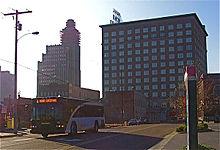
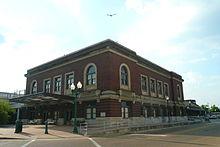
Jackson is served by Jackson-Evers International Airport, located at Allen C. Thompson Field, east of the city in Pearl in Rankin County. Its IATA code is JAN. The airport has non-stop service to 12 cities throughout the United States and is served by 5 scheduled carriers (American, Delta, United, Southwest, and US Airways)
On December 22, 2004, Jackson City Council members voted 6 ae0 to rename Jackson International Airport in honor of slain civil rights leader and field secretary for the Mississippi chapter of the NAACP, Medgar Evers. This decision took effect on January 22, 2005.
Formerly Jackson was served by Hawkins Field Airport, located in northwest Jackson, with IATA code HKS, which is now used for private air traffic only.
Underway is the Airport Parkway project. The environmental impact study is complete and final plans are drawn and awaiting Mississippi Department of Transportation approval. Right-of-way acquisition is underway at an estimated cost of $19 million. The Airport Parkway will connect High Street in downtown Jackson to Mississippi Highway 475 in Flowood at Jackson-Evers International Airport. The Airport Parkway Commission consists of the Mayor of Pearl, the Mayor of Flowood, and the Mayor of Jackson, as the Airport Parkway will run through and have access from each of these three cities.
 Interstate 20
Interstate 20
 Interstate 55
Interstate 55
 Interstate 220
Interstate 220
 U.S. Highway 49
U.S. Highway 49
 U.S. Highway 51
U.S. Highway 51
 U.S. Highway 80
U.S. Highway 80
 Mississippi Highway 18
Mississippi Highway 18
 Mississippi Highway 25
Mississippi Highway 25
In addition, Jackson is served by the Natchez Trace Parkway, which runs from Natchez to Nashville, Tennessee.
JATRAN (Jackson Transit System) operates hourly or half-hourly during daytime hours on weekdays, and mostly hourly on Saturdays. No evening or Sunday Service provided.
Jackson is served by the Canadian National Railway (CN) and Kansas City Southern Railway (KCS). CN has a medium-sized yard downtown which Mill Street parallels and KCS has a large classification yard in Richland. Amtrak, the national passenger rail system, provides service to Jackson. The Amtrak station is located at 300 West Capitol Street. Amtrak's southbound City of New Orleans provides service from Jackson to New Orleans and some points between. The northbound City of New Orleans provides service from Jackson to Memphis, Carbondale, Champaign-Urbana, Chicago and some points between. Efforts to establish service with another Amtrak train, the Crescent Star, an extension of the Crescent westward from Meridian, Mississippi to Dallas, Texas, failed in 2003.
Jackson is home to several major industries. These include electrical equipment and machinery, processed food, and primary and fabricated metal products. The surrounding area supports agricultural development of livestock, soybeans, cotton, and poultry. Major private companies based in Jackson include Ergon.
The following companies are headquartered in Jackson:
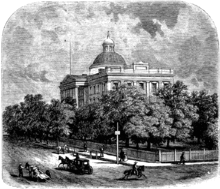
In 1985, Jackson voters opted to replace the three-person mayor-commissioner system with a city council. Jackson's city council members represent the city's seven wards, and the body is headed by the mayor who is elected by the entire city.
Jackson's current mayor is Harvey Johnson, Jr..
The Mississippi Department of Corrections (MDOC) operates the Jackson Probation & Parole Office in Jackson. The MDOC Central Mississippi Correctional Facility, in unincorporated Rankin County, is located in proximity to Jackson.
The United States Postal Service operates the Jackson Main Post Office and several smaller post offices.
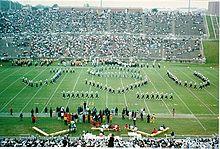
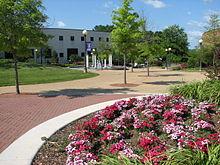
Jackson is home to the international headquarters of Phi Theta Kappa, an honor society for students enrolled in two-year colleges.
Jackson Public School District operates public schools.
The district's high schools include:
Private secondary schools include:
Private primary schools include:
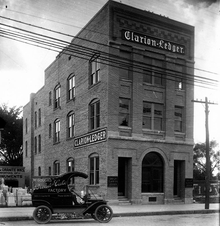

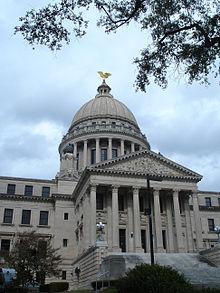
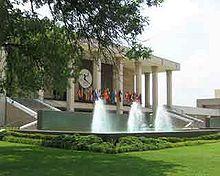
Jackson is a city famous for its music ae including Gospel, Blues, and R&B. Jackson is also home to the world famous Malaco Records recording studio. Many notable musicians hail from Jackson.
Jackson, MS is mentioned in the 1973 song Uneasy Rider by Charlie Daniels.
Rap rocker Kid Rock made a song about Jackson, aptly titled "Jackson, Mississippi", in 2003.
The Rolling Stones sat "in a bar tippling a jar in Jackson" in their song 'Country Honk' on the 1969 album 'Let It Bleed'. "And on the street the summer sun it shines. There's many a bar-room queen I've had in Jackson, but I just can't seem to drink you off my mind."
"Jackson" is a song written by Jerry Leiber and Billy Edd Wheeler about newlyweds making the discovery that, after jumping much too quickly into marriage, the "fire" has gone out of their relationship. They both want to go to Jackson, where each looks forward to a new life free of the other. Although the song does not specify whether Jackson, TN or Jackson, MS is the destination, the lyrics do clearly reference gambling. During the period from the 1920s until the 1960s, illegal gambling casinos flourished on the east side of the Pearl River, along the original U.S. Route 80 just outside the city of Jackson, MS in Flowood. The infamous casinos might have been the inspiration for those lyrics.
In any event, the best-known single releases of the song include the 1968 Grammy Award winner by Johnny Cash and June Carter Cash, and the hit Nancy Sinatra and Lee Hazelwood version from the same year. Much later, the song was performed by Joaquin Phoenix and Reese Witherspoon (playing Johnny Cash and June Carter) in the 2005 film Walk the Line.
Those illegal casinos referenced (perhaps) by the song, along with bootleg liquor stores and nightclubs, made up the Gold Coast, a strip of mostly black-market businesses which operated for decades along Flowood Road, just across the Pearl River from downtown Jackson. Though it existed outside the law, the Gold Coast was a thriving center of nightlife and music, with many local blues musicians appearing in the clubs regularly. The Gold Coast disappeared after Mississippi's prohibition laws were repealed in 1966, allowing Hinds County, including Jackson, to go "wet".
In 1978, the USA International Ballet Competition was founded in Jackson by Thalia Mara, who is also the namesake of Thalia Mara Hall where the competition is held. The following year saw the first USA International Ballet Competition held as part of the worldwide International Ballet Competition (IBC), which itself originated in Varna, Bulgaria in 1964. The competition eventually expanded to rotating annual events between Jackson, Varna, Moscow and Tokyo. It was in 1979 that the event first came to the United States, to Jackson, where it now returns every four years. The rotation is currently among Jackson, Varna, Helsinki, Finland, and Shanghai, China. Jackson has been the host of the IBC in 1979, 1982, 1986, 1990, 1994, 1998, 2002 and 2006. The next competition in Jackson will be in 2010. The United States Congress recognized Jackson and the USA IBC by passing a Joint Resolution in 1982 that designated Jackson as the official home of the USA IBC.
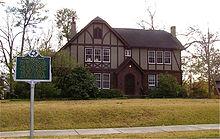
Jackson, Mississippi received its first Mississippi Blues Trail designation. The ceremony was held and the historic marker placed on the former site of the Subway Lounge on Pearl Street. The Subway Lounge was in the basement of the old Summers Hotel, one of two hotels available as lodging to blacks before desegregation when it opened in 1943. In the 1960s, the hotel added a lounge in the basement that featured jazz. In the 1980s, when the lounge was revived, it was catered to late night blues performers. In 2002, the Subway Lounge was filmed for a documentary entitled Last of the Mississippi Jukes.
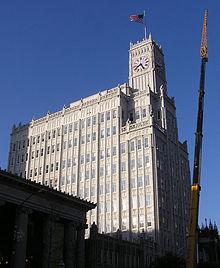
Currently, Jackson is experiencing $1.6 billion in downtown development. The public-private projects include new construction, renovation and adaptation of some existing buildings, including conversions into residential space; and improvements to public infrastructure and amenities.
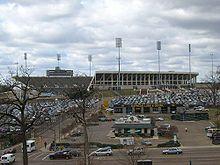
see: List of people from Mississippi
Word Count: 6137





